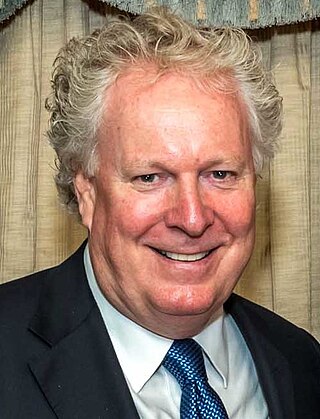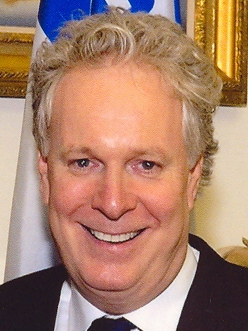Related Research Articles
The Parti Québécois is a sovereignist and social democratic provincial political party in Quebec, Canada. The PQ advocates national sovereignty for Quebec involving independence of the province of Quebec from Canada and establishing a sovereign state. The PQ has also promoted the possibility of maintaining a loose political and economic sovereignty-association between Quebec and Canada. The party traditionally has support from the labour movement; however, unlike most other social democratic parties, its ties with organized labour are informal. Members and supporters of the PQ are nicknamed péquistes, a French word derived from the pronunciation of the party's initials.

John James "Jean" Charest is a Canadian lawyer and former politician who served as the 29th premier of Quebec from 2003 to 2012. Prior to that, he was a member of Parliament (MP) between 1984 and 1998. After holding several Cabinet posts from 1986 to 1990 and from 1991 to 1993, he was the leader of the Progressive Conservative Party of Canada from 1993 to 1998.

The Action démocratique du Québec, commonly referred to as the ADQ, was a right-wing populist and conservative provincial political party in Quebec, Canada. On the sovereignty question, it defined itself as autonomist; it had support from nationalists and federalists. Its members were referred to as adéquistes, a name derived from the French pronunciation of the initials 'ADQ'.

The 2003 Quebec general election was held on April 14, 2003, to elect members of the National Assembly of Quebec (Canada). The Parti libéral du Québec (PLQ), led by Jean Charest, defeated the incumbent Parti Québécois, led by Premier Bernard Landry, in a landslide.

The 1998 Quebec general election was held on November 30, 1998, to elect members of the National Assembly of the Province of Quebec, Canada. The incumbent Parti Québécois, led by Premier Lucien Bouchard, won re-election, defeating the Quebec Liberal Party, led by Jean Charest. To date this is the last election where the Parti Québécois won a majority of seats in the Quebec Assembly, although not the last in which it formed a government.

The 2007 Quebec general election was held in the Canadian province of Quebec on March 26, 2007 to elect members of the 38th National Assembly of Quebec. The Quebec Liberal Party led by Premier Jean Charest won a plurality of seats, but were reduced to a minority government, Quebec's first in 129 years, since the 1878 general election. The Action démocratique du Québec, in a major breakthrough, became the official opposition. The Parti Québécois was relegated to third-party status for the first time since the 1973 election. The Liberals won their lowest share of the popular vote since Confederation, and the PQ with their 28.35% of the votes cast won their lowest share since 1973 and their second lowest ever. Each of the three major parties won nearly one-third of the popular vote, the closest three-way split in Quebec electoral history until the 2012 election. This was however, the closest three-way race in terms of seat count. Voter turnout among those eligible was 71.23%, a marginal difference from the previous general election in 2003.
Rivière-du-Loup is a former provincial electoral district in the Bas-Saint-Laurent region of Quebec, Canada, which elected members to the National Assembly of Quebec.

Roch Cholette is a Canadian public accountant and a former municipal and provincial politician in Quebec, Canada.

The 2008 Quebec general election was held in the Canadian province of Quebec on December 8, 2008. The Quebec Liberal Party, under incumbent Premier Jean Charest, was re-elected with a majority government, marking the first time since the 1950s that a party or leader was elected to a third consecutive mandate, and the first time for the Liberals since the 1930s, when Louis-Alexandre Taschereau was Premier.
The 39th National Assembly of Quebec consisted of those elected in the 2008 Quebec general election. It was in session from January 13, 2009 to February 22, 2011 and from February 23, 2011 to August 1, 2012. Jean Charest (Liberal) served as Premier and Pauline Marois (PQ) was the leader of the opposition.

Jean-Martin Aussant is a Canadian economist, musician, and politician, now serving as Executive director of the Chantier de l'économie sociale. He represented Nicolet-Yamaska in the National Assembly of Quebec from 2008 to 2012, first as a member of the Parti Québécois and then as leader of his own party, Option nationale. He was defeated when he ran for re-election in Nicolet-Bécancour in the 2012 general election. He later rejoined the Parti Québécois to run unsuccessfully in the 2018 Quebec election.

The 2012 Quebec general election took place in the Canadian province of Quebec on September 4, 2012. Lieutenant Governor Pierre Duchesne dissolved the National Assembly on August 1, 2012, following Premier Jean Charest's request. The Parti Québécois were elected to a minority government, with Pauline Marois becoming the first woman to be Premier of Quebec. The Quebec Liberal Party took second place, with Premier Jean Charest losing his seat. The newly formed party Coalition Avenir Québec led by François Legault took third place, while Québec solidaire took 2 seats out of the 125.
Three provincial by-elections were held in Quebec in 2010 to fill vacancies in the National Assembly.
France Dionne is a politician from Quebec, Canada. She served as a member of the National Assembly of Quebec from 1985 to 1997 sitting with the Liberal caucus in government and opposition.
Jean-Sébastien Lamoureux is a Canadian lawyer, manager and former politician in the province of Quebec. He served in the National Assembly of Quebec as a Liberal from 1998 until his resignation in 2001.

The 2014 Quebec general election was held on April 7, 2014 to elect members to the National Assembly of Quebec. The incumbent Parti Québécois which had won a minority government in 2012 was defeated by the Quebec Liberal Party under Philippe Couillard who won a majority government of 70 seats, while the incumbent Parti Québécois finished second with 30 seats, becoming the first single-term government since Jean-Jacques Bertrand's Union Nationale government was defeated in 1970. Pauline Marois electoral defeat marked the shortest stay of any Quebec provincial government since the Canadian Confederation. It marked the lowest seat total for the Parti Québécois since 1989 and its smallest share of the popular vote since its inaugural run in 1970, as Premier Pauline Marois lost her own riding. The Coalition Avenir Québec under François Legault made minor gains in terms of seats despite receiving a smaller share of the popular vote than in the previous election. Québec solidaire won an additional seat, though co-spokesperson Andrés Fontecilla failed to win his riding. This election saw the return of the Liberals to power 2 years after their defeat in 2012. To date this is the last election where the Liberal Party won a majority of seats in the Quebec Assembly.

The 40th National Assembly of Quebec consisted of those elected in the 2012 general election and two by-elections in December 2013. Pauline Marois (PQ) was the premier. The leader of the opposition changed twice. Jean-Marc Fournier (Liberal) started as leader of the opposition after the resignation of former Liberal Premier Jean Charest who lost his seat in the last provincial election. Philippe Couillard was elected Liberal leader and won election to the assembly in a by-election on December 9, 2013. The assembly was dissolved on March 5, 2014.

The 2018 Quebec general election was held on October 1, 2018, to elect members to the National Assembly of Quebec. The election saw a landslide victory for the Coalition Avenir Québec (CAQ) led by François Legault, which won 74 of 125 seats, giving the party a majority and unseating the Quebec Liberal Party. The Liberals became the official opposition with 31 seats.

The 42nd National Assembly of Quebec consists of those elected in the October 1, 2018, general election. As a result, François Legault became Premier on October 18.

The 2022 Quebec general election was held on October 3, 2022, to elect the members of the National Assembly of Quebec. Under the province's fixed election date law, passed in 2013, "the general election following the end of a Legislature shall be held on the first Monday of October of the fourth calendar year following the year that includes the last day of the previous Legislature", setting the date for October 3, 2022.
References
- 1 2 Philip Authier, "Liberal Party chief's absence upstages Charest's speech". The Gazette , 23 May 2009.
- ↑ (in French) "Jean D'Amour coupable de conduite avec facultés affaiblies". radiocanada.ca, 5 March 2009.
- ↑ Don Macpherson, "About time: Charest has finally called by-elections to fill the seats vacated by Dumont and Jérôme-Forget" Archived 3 May 2012 at the Wayback Machine . The Gazette, 21 May 2009.
- ↑ CJAD, 19 June 2009.
- ↑ Chantal Hébert, "PQ plan to anger us hints at desperation". Toronto Star , 22 June 2009.
- ↑ "Jean D'Amour leaves Liberal caucus". The Gazette , 10 November 2009.
- ↑ "Liberal MNA to sit as independent". CBC News. 10 November 2009. Retrieved 28 May 2015.
- ↑ "Jean d'Amour rejoins Quebec Liberal caucus". CBC News. 24 December 2009. Retrieved 28 May 2015.
